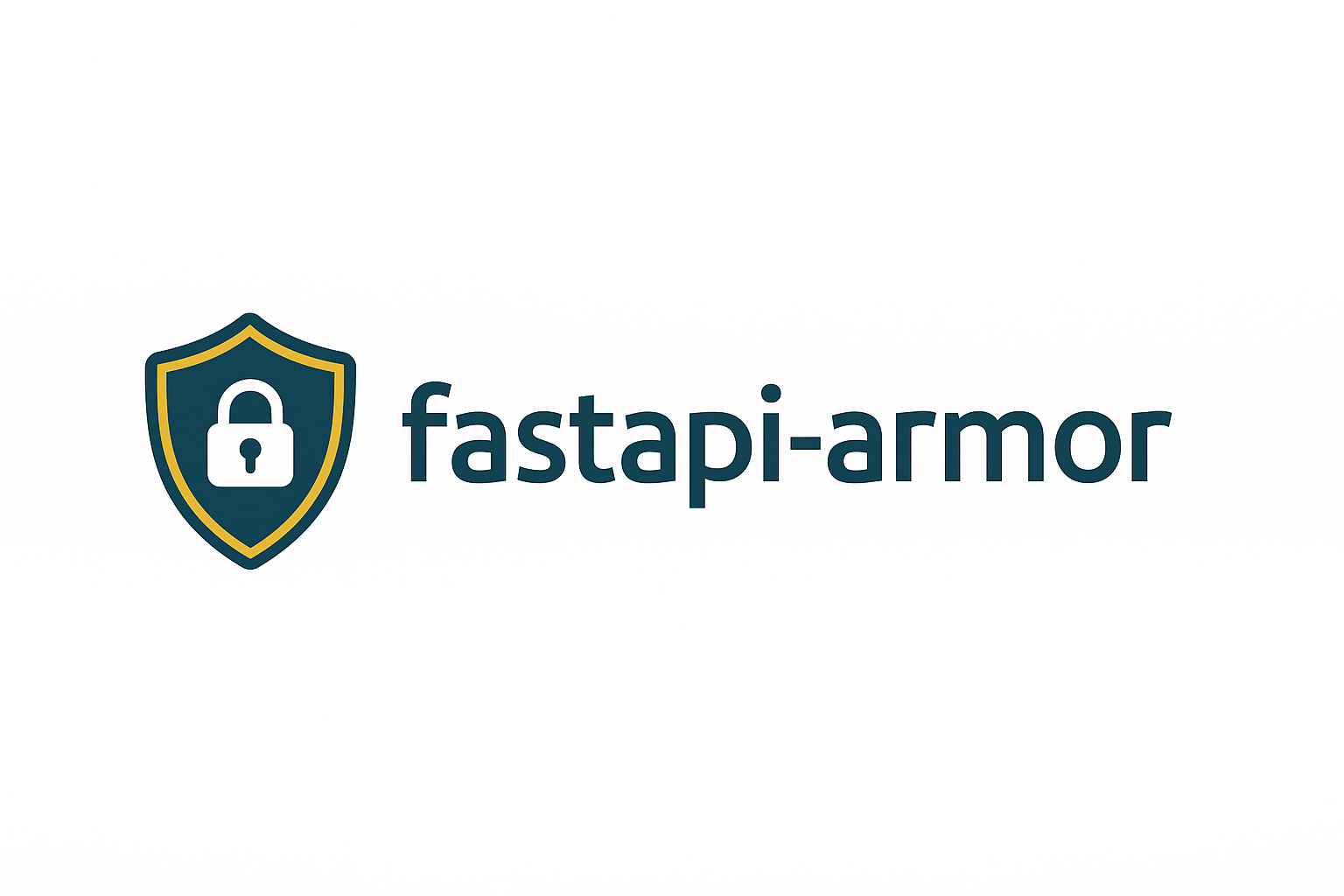
Secure your FastAPI apps with a single line of code 🛡️
fastapi-armor is a security middleware that sets modern HTTP security headers for every response. It provides presets for common configurations (strict, relaxed, none) and allows overrides for full customization.


🚀 Features
- 📦 Simple plug-and-play integration with FastAPI
- 🛡️ Protects your app with modern HTTP security headers
- ⚙️ Fully customizable settings
- 🧱 Built on top of Starlette and fully async
📦 Installation
Install via pip:
pip install fastapi-armor
⚙️ Usage Example
Here’s how to use ArmorMiddleware in a FastAPI application:
from fastapi import FastAPI
from fastapi_armor.middleware import ArmorMiddleware
app = FastAPI()
app.add_middleware(
ArmorMiddleware,
preset="strict",
permissions_policy="geolocation=(), microphone=()"
)
@app.get("/")
async def read_root():
return {"message": "FastAPI with Armor Middleware is running!"}
▶️ Running the App
To run this FastAPI app locally using uvicorn, first install the required packages:
pip install fastapi uvicorn
Then start the app:
uvicorn example.main:app --reload
Visit your app at http://127.0.0.1:8000
You can inspect the HTTP headers in the browser or via curl:
curl -I http://127.0.0.1:8000
🎛️ Available Presets
You can use built-in presets to quickly apply a set of secure headers. These presets are designed for different use cases:
strict | Applies all recommended security headers with strict values for maximum protection. |
relaxed | Applies a lighter set of headers suitable for more flexible or development environments. |
none | Disables all headers. Useful for debugging or local development where security is not a concern. |
You can also override any individual header even when using a preset:
app.add_middleware(
ArmorMiddleware,
preset="strict",
permissions_policy="geolocation=(), microphone=()"
)
This table shows how to customize headers in the middleware by mapping FastAPI-Armor's parameter names to actual HTTP header fields:
content_security_policy | Content-Security-Policy | "default-src 'self'; img-src *;" |
frame_options | X-Frame-Options | "DENY" or "SAMEORIGIN" |
hsts | Strict-Transport-Security | "max-age=63072000; includeSubDomains; preload" |
x_content_type_options | X-Content-Type-Options | "nosniff" |
referrer_policy | Referrer-Policy | "no-referrer" or "strict-origin" |
permissions_policy | Permissions-Policy | "geolocation=(), microphone=()" |
dns_prefetch_control | X-DNS-Prefetch-Control | "off" or "on" |
expect_ct | Expect-CT | "max-age=86400, enforce" |
origin_agent_cluster | Origin-Agent-Cluster | "?1" or "?0" |
cross_origin_embedder_policy | Cross-Origin-Embedder-Policy | "require-corp" |
cross_origin_opener_policy | Cross-Origin-Opener-Policy | "same-origin" or "unsafe-none" |
cross_origin_resource_policy | Cross-Origin-Resource-Policy | "same-origin", "same-site", or "cross-origin" |
Use these parameter names when configuring the middleware. For example, permissions_policy="geolocation=()" will set the Permissions-Policy HTTP header.
By default or optionally, ArmorMiddleware can apply the following headers:
Content-Security-Policy | Mitigates XSS and data injection attacks by specifying allowed content sources. |
X-Frame-Options | Prevents clickjacking by disallowing rendering inside <iframe>. |
Strict-Transport-Security | Forces use of HTTPS for future requests, helping prevent man-in-the-middle attacks. |
X-Content-Type-Options | Disables MIME-type sniffing to avoid content-type confusion. |
Referrer-Policy | Controls the Referer header sent in requests — reduces accidental info leakage. |
Permissions-Policy | Limits access to browser APIs like geolocation, camera, microphone, etc. |
X-DNS-Prefetch-Control | Prevents browsers from resolving DNS of external domains before user interaction. |
Expect-CT | Ensures valid Certificate Transparency logs for HTTPS connections. |
Origin-Agent-Cluster | Provides context isolation for enhanced privacy and safety. |
Cross-Origin-Embedder-Policy (COEP) | Blocks loading resources unless they explicitly allow being embedded. |
Cross-Origin-Opener-Policy (COOP) | Helps isolate browsing contexts to prevent cross-window attacks. |
Cross-Origin-Resource-Policy (CORP) | Restricts which origins can load resources from your site. |
📚 Standards References
For more details on these headers and their standard definitions, refer to the following official resources:
Official Standards & Specifications
Security Organizations & Best Practices
Documentation & Practical Implementation
These resources represent officially accepted standards, specifications, and industry best practices for implementing security headers in modern web applications.
👥 Contributors
Special thanks to the following contributors who have helped improve this project:
If you'd like to contribute, please feel free to submit a pull request!
📄 License
This project is licensed under the MIT License.
© 2025 Inan Delibas






